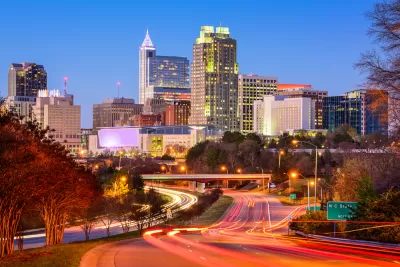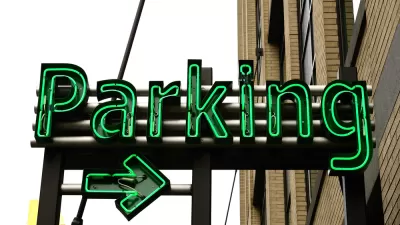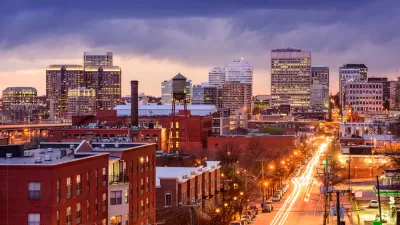Raleigh, North Carolina is the latest in a series of cities pursuing a significant departure from the 20th century planning status quo.

"The Raleigh City Council voted 6-to-1 Tuesday to begin a process to remove parking minimums and change parking maximums throughout the city," reports Anna Johnson.
Jason Hardin, a senior planner with the city, is cited in the article explaining how parking reform has been used as a tool for reducing vehicle trips and emissions in cities like Minneapolis and San Francisco.
“Over-reliance on driving contributes to climate change, degrades air quality and creates poor health outcomes,” Hardin said in a city memo. “Minimum parking requirements do the same by acting as an incentive to drive.”
Johnson also documents the City Council discussion that led to the final vote. While opposition was scant on the council, according to Hardin's memo, city planners are anticipating concerns about parking spillover into neighborhoods.
Raleigh Planning Department staff will still have to draft a text change for Planning Commission approval and then a final vote by the Raleigh City Council before parking reforms are implemented.
In January 2020, Planetizen picked up news that a then-newly elected, younger Raleigh City Council entered office with intentions to implement parking reforms as well as zoning reforms to spur Missing Middle Housing development. The Raleigh parking reform news follows just days after the City Council of Richmond, Virginia voted to take the first steps toward parking reforms.
FULL STORY: Raleigh may drop parking requirements for new development

Maui's Vacation Rental Debate Turns Ugly
Verbal attacks, misinformation campaigns and fistfights plague a high-stakes debate to convert thousands of vacation rentals into long-term housing.

Planetizen Federal Action Tracker
A weekly monitor of how Trump’s orders and actions are impacting planners and planning in America.

In Urban Planning, AI Prompting Could be the New Design Thinking
Creativity has long been key to great urban design. What if we see AI as our new creative partner?

King County Supportive Housing Program Offers Hope for Unhoused Residents
The county is taking a ‘Housing First’ approach that prioritizes getting people into housing, then offering wraparound supportive services.

Researchers Use AI to Get Clearer Picture of US Housing
Analysts are using artificial intelligence to supercharge their research by allowing them to comb through data faster. Though these AI tools can be error prone, they save time and housing researchers are optimistic about the future.

Making Shared Micromobility More Inclusive
Cities and shared mobility system operators can do more to include people with disabilities in planning and operations, per a new report.
Urban Design for Planners 1: Software Tools
This six-course series explores essential urban design concepts using open source software and equips planners with the tools they need to participate fully in the urban design process.
Planning for Universal Design
Learn the tools for implementing Universal Design in planning regulations.
planning NEXT
Appalachian Highlands Housing Partners
Mpact (founded as Rail~Volution)
City of Camden Redevelopment Agency
City of Astoria
City of Portland
City of Laramie





























